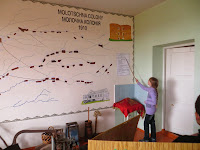As we evaluate our time in Ukraine these past months, we are struck by the variety of impressions we will take with us: economic, geographic, historical, and of course the many heart-felt expressions of gratitude for the help received from Mennonite Centre donors.
Financially many people in the rural villages struggle to make ends meet. Their pensions and/or salaries are insufficient to pay for medical treatments. Directors of institutions tell us that the money they were promised to run the school or hospital is in the budget, but they are unable to access these funds. Recently a school director shared with us how she had just received the news from the education department that her staff would have to take 3 days of unexpected holidays - without pay! Or we hear of situations in other institutions where staff are working but have not received their salaries. On the other hand, we notice how many more goods, such as grocery products and fresh meat, are now available in our village, in comparison to what was available during our first term in 2006. There must be customers buying these items or shops would not carry them. Huge box stores in large cities display fancy furniture, elaborate bathroom fixtures, etc., so it seems that some of the population can afford these luxuries.
We travelled into southern Ukraine last week and were once again struck by the beauty of this area. The view of the Black Sea, the mountains, the lush and varied vegetation, along with solid buildings, and tidy public spaces, are quite a contrast to the scenes in our village.

During a recent visit to the war memorial a few kilometers from here, we were once again reminded of the horrific battle that took place here during World War II. Thousands of Russians/Ukranians lost their lives in that battle. What we had not heard before was that besides the thousands of soldiers who lost their lives, there were also hundreds of unarmed prisoners who were released from prison to become a human shield for the Russian army. Such historical events leave a huge impact on the local population for many generations.

 Discovering personal historical connections has been a delight for us. When our son and his wife visited here last week, we drove out to one of the villages to see the original home of our son’s grandfather and great-grandfather. Our daughter-in-law discovered that her great-grandmother had worked as a servant in the Willms palace, which still stands next door to our present apartment block, though in serious disrepair. Her great-grandfather worked as a professional photographer in this village almost 100 years ago.
Discovering personal historical connections has been a delight for us. When our son and his wife visited here last week, we drove out to one of the villages to see the original home of our son’s grandfather and great-grandfather. Our daughter-in-law discovered that her great-grandmother had worked as a servant in the Willms palace, which still stands next door to our present apartment block, though in serious disrepair. Her great-grandfather worked as a professional photographer in this village almost 100 years ago.
So how about a present day connection? For our chai break this morning Ira had baked a tasty plum cake, so similar to fruit platz baked by Mennonites back home. The plums, as well as a half-bushel of large apples, were gifts to the Mennonite Centre from a grateful Mom whose daughter is a recipient of one of our scholarships. Was it delicious? Yes - vkoozna!





























